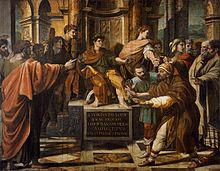Elymas

Elymas , also (known as Bar-Jesus Aramaic . Bar-Yeshua, son of Jesus lat. Bariesu), was a Jewish magician in the wake of the Roman Senate appointed governor of Cyprus , of the New Testament in the Acts of the Apostles 13.6 -12 EU is mentioned.
The name Elymas is given in Acts 13: 8 as a translation of the name of Bar-Jesus - although the Greek text here can also be understood to mean that "magician" (Magos) is the translation of the name "Elymas". Presumably this refers to a Semitic root, namely either Arabic alim ( sage ) or Aramaic haloma (interpreter of dreams).
The Acts of the Apostles of Luke calls him a "Magos", i. H. “ Magician ” (originally a loan word from Persian, where Mager denotes wise men or members of a priestly caste, for example Mt 2,1). According to the biblical description, Elymas tried to influence the governor, the Roman proconsul Sergius Paullus , against the message proclaimed by Paul of Tarsus and Barnabas . The two apostles had been summoned by the governor to Paphos in Cyprus to tell him about Jesus . The apostle Paul is referred to by his Roman name for the first time at this point . It was common for Jews to also take on a Greek or Roman name, and from now on Saul / Paul moved more and more into non-Jewish cultures. The announcement of doom is made: Paul pronounced a temporary blindness over Elymas as God's punishment. Immediately "darkness and darkness" fell on him, so that he had to be led by the hand. Early interpreters such as Beda Venerabilis referred to Paul's own experience of blindness: The darkening of the eyes could favor an enlightenment of the mind. A reference to astrological practices of the magician Bar-Jesus is also conceivable.
After this miracle, the proconsul Sergius Paullus is said to have converted to the Christian faith. After that, John Mark separated from Paul and Barnabas and returned to Jerusalem . Paul and Barnabas, on the other hand, traveled to the hometown of Sergius Paullus' family, Antioch near Pisidia .
Individual evidence
- ↑ So the Latin spelling of the name, the spelling "Paulus" with an L comes from the Greek transcription of this name used in the Acts of the Apostles.
- ↑ Michael Hesemann : Cyprus: Where Saul really became Paul. Johannes M Schwarz, Erik Diewald, Dorothea Schlee, June 5, 2010, accessed on May 21, 2012 : “Even if the vernacular claims that Saul became Paul in Damascus, it is quite different in the Acts of the Apostles. Luke calls him Saul exactly until the man from Tarsus stands in front of his namesake in Paphos. Then finally you read: 'Saul, who is also called Paul ...' "
- ↑ John Stott : The Message of the Acts of the Apostles. An exegetical-homiletic commentary . Hänssler, Holzgerlingen 2000, p. 316.
- ^ FF Bruce : Commentary on the Book of the Acts (New London Commentaries). 1977 ( 1 1954), p. 265.
- ↑ See e.g. B. Hans-Josef Klauck: Magic and Paganism in the Acts of the Apostles of Luke . Stuttgart 1996, p. 61: "He will no longer see the light of the sun that he needs for his calculations."
| personal data | |
|---|---|
| SURNAME | Elymas |
| ALTERNATIVE NAMES | Bar-jesus; Bar-Yeshua (Aramaic); Bariesu (Latin) |
| BRIEF DESCRIPTION | Jewish magician |
| DATE OF BIRTH | 1st century BC BC or 1st century |
| DATE OF DEATH | 1st century or 2nd century |